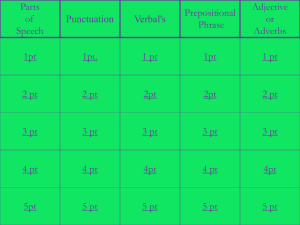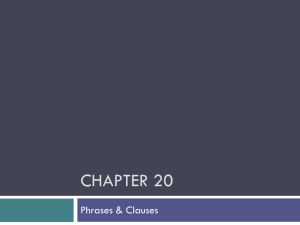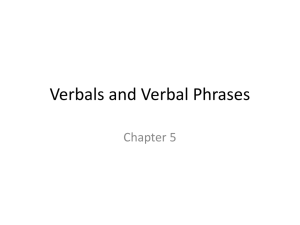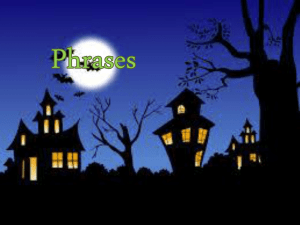Around the World Clauses
advertisement
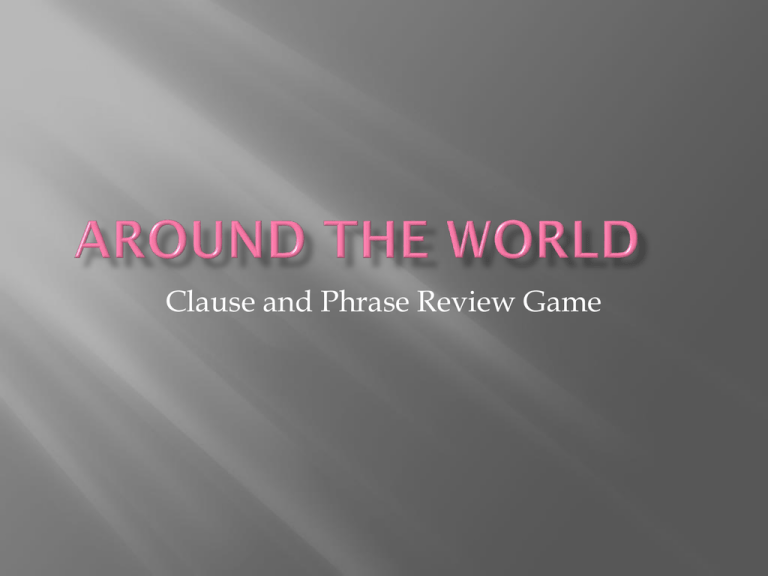
Clause and Phrase Review Game Which of the following is a true statement about prepositional phrases? A. Prepositional phrases begin with a preposition and end with a verb phrase. B. Prepositional phrases must contain adverbs and adjectives as modifiers. C. Prepositional phrases act like single word adjectives and adverbs, and they relate to another word in the sentence. D. Prepositional phrases will always contain a verb. A. B. C. D. Mr. Robinson resides ____ Pear Orchard Road. Beside Below On About I sat ____ the stream as I read a delightful poem. A. By B. Around C. In addition to D. Without ____ to science and social studies, Mary also enjoys studying mathematics and English. A. Between B. During C. Next to D. In addition to Look in the drawer with the brass handle. A. Verb phrase B. Appositive Phrase C. Adjective Prepositional Phrase D. Adverb Prepositional Phrase Although you liked the steak sandwich with lettuce and tomato on it, I enjoyed the steak sandwich with cheese. A. Verb phrase B. Appositive Phrase C. Adjective Prepositional Phrase D. Adverb Prepositional Phrase The plants in the greenhouse need watering. A. Verb phrase B. Appositive Phrase C. Adjective Prepositional Phrase D. Adverb Prepositional Phrase Some of the books on the table are Kim’s. A. Verb phrase B. Appositive Phrase C. Adjective Prepositional Phrase D. Adverb Prepositional Phrase Carol’s expression was too funny for words. A. Verb phrase B. Appositive Phrase C. Adjective Prepositional Phrase D. Adverb Prepositional Phrase (It modifies the predicate adjective funny.) Both Wisconsin and Mississippi were named by the Chippewa Indians. A. Verb phrase B. Appositive Phrase C. Adjective Prepositional Phrase D. Adverb Prepositional Phrase The elevator ride to the top of the Sears Tower takes 54 seconds. A. Verb phrase B. Appositive Phrase C. Adjective Prepositional Phrase D. Adverb Prepositional Phrase Carly swept the crumbs under the rug. A. Verb phrase B. Appositive Phrase C. Adjective Prepositional Phrase D. Adverb Prepositional Phrase The speaker, a famous explorer, told about Papua, New Guinea. A. Verb phrase B. Appositive Phrase C. Adjective Prepositional Phrase D. Adverb Prepositional Phrase Which statement below is NOT TRUE about clauses? A. A clause will always end with a noun or a pronoun. B. A clause is a word group with a subject and a verb that may or may not complete a thought. C. A clause may be main or subordinate. D. A clause may be independent or dependent. A dependent clause is (or does) all of the following except A. Subordinate B. Incomplete in thought C. Reliant on the main clause D. Stand alone as a complete thought Which of the following describes the pattern of a compound-complex sentence? A. IC + , + conjunction + IC + DC B. DC + , + IC + , + conjunction + IC C. IC + ; + DC + , + IC D. DC + , + IC + DC Dependent Clause + comma + Independent Clause + Dependent Clause = Complex Sentence This song, which was written by Elton John, is upbeat. A. Adverb phrase B. Adverb clause C. Adjective phrase D. Adjective clause Pam sat where she could be most comfortable. A. Adverb phrase B. Adverb clause C. Adjective phrase D. Adjective clause When we arrived in Seattle, it was very cold. A. Adverb phrase B. Adverb clause C. Adjective phrase D. Adjective clause There was plenty of ribbon because we had saved it from Christmas. A. Adverb phrase B. Adverb clause C. Adjective phrase D. Adjective clause I know the cave that you are talking about. A. Adverb phrase B. Adverb clause C. Adjective phrase D. Adjective clause Two partridges rose and whirred away as we approached. A. Adverb phrase B. Adverb clause C. Adjective phrase D. Adjective clause We arrived on time for the basketball game at Olde Towne. A. Adverb phrase B. Adverb clause C. Adjective phrase D. Adjective clause Laura’s the one who telephoned us about the delayed plane at the airport in Chicago. A. Adverb phrase B. Adverb clause C. Adjective phrase D. Adjective clause Laura’s the one who telephoned us about the delayed plane at the airport in Chicago. A. Adverb phrase B. Adverb clause C. Adjective phrase D. Adjective clause A(n) _________ contains a verb but can’t stand alone as a complete sentence because it relies on the main clause. A. Subordinate Clause B. Dependent Clause C. Main Clause D. Independent Clause E. Both A and B F. Both C and D A compound sentence can/will have all of the following except A. At least two independent clauses B. A comma and a conjunction C. A fragment D. A semicolon Since the mules were slow, several tourists walked beside them. A. The independent clause is “Since the mules were slow.” B. The independent clause in this sentence is at the beginning and begins with a capital letter. C. This sentence is a run-on. D. The main clause in the sentence begins after the comma and ends at the period. The family who owns the snowmobile lives next door. A. The main clause is “who owns the snowmobile.” B. The main clause is “The family lives next door.” C. This is a complex sentence. D. Who owns the snowmobile is an adverb clause. E. A, B, C are all correct. F. Only B and C are correct. G. B, C, and D are correct. Cassie understands clauses and phrases, but she struggles with Case 21 questions. A. The subordinate clause is “she struggles with Case 21 questions.” B. The subordinate clause is “Cassie understands clauses and phrases.” C. This sentence is a run-on. D. This sentence is compound and has two independent clauses. There were over eighty people in line; I counted them. A. Simple B. Compound C. Complex D. Compound-Complex Since our flight to San Diego was delayed, we missed our connection to Hawaii. A. Simple B. Compound C. Complex D. Compound-Complex Nobody got the answer because the problem was too difficult, but Mrs. Autrey gave us a second chance. A. Simple B. Compound C. Complex D. Compound-Complex Neither the guitar not the banjo is difficult to play. A. Simple B. Compound C. Complex D. Compound-Complex Yesterday’s teens and today’s youth have had a variety of interests. A. Simple B. Compound C. Complex D. Compound-Complex Which of the following sentences contains an adjective clause? A. Jerry put the boxes behind the garage. B. Sue read the newspaper as she waited for the bus. C. Baby Tenderlove, which was my favorite doll when I was young, is now a collector’s item. D. Who in this room is allergic to peanuts? C. Baby Tenderlove, which was my favorite doll when I was young, is now a collector’s item. Which of the following sentences contains an adverb clause? A. Sam has the horse that jumps the best. B. Your camera is in the closet where we keep the skates. C. As the mist cleared, Pike’s Peak came into view. D. Is this the coat that you want for Hanukah? C. As the mist cleared, Pike’s Peak came into view. Which sentence is written correctly? A. Burt, who was still awake, smell the smoke from the fire. B. We lost the picture that you gave to we. C. Kelly is the girl who wrote the short poem Kelly’s Wish. D. Have you ever read the poem “Paul Revere’s Ride” by Longfellow? D. Have you ever read the poem “Paul Revere’s Ride” by Longfellow? Which sentence is NOT written correctly? A. At 8:30 A.M. the following students are to report to the gym: Doug Smith, Beth Rucker, and Lynn Kimbell. B. Gina’s great-grandfather founded the small town of Chenoa. C. The head coaches decision to have two extra practices was helpful. D. At 7:30 A.M. Mary jumped out of bed and started getting ready for school; then she remembered that it was Saturday. The head coach’s decision… A. All the letters must be postmarked by January 1, 2013, to be considered eligible for the contest. B. “Andrea,” Sally said, “may I borrow your camera this weekend?” C. “Joan, have you seen that movie yet? Asked Joe. D. “It was Patrick Henry,” declared Liz, “who said, ‘Give me liberty or give me death!’” A. B. C. D. Thomas Edison invented electric lights. This sentence is simple. The verb “invented” is transitive. “Lights” is the direct object. “Electric” is an adverb modifying the verb invented. Annie knitted Kim a sweater for Christmas. A. Indirect Object B. Direct Object C. Subject D. Object of the preposition We gave the boat a fresh coat of paint yesterday. . Indirect Object B. Direct Object C. Subject D. Object of the preposition Which sentence below is compound and has a transitive verb? A. The other choir members sang beautifully, but I did not. B. The boys and girls delighted us with their music a the choir concert. C. I enjoyed listening to the choir and the band, and my husband videotaped the performances. D. Although I am not musical, I still enjoy music. C. I enjoyed listening to the choir and the band, and my husband videotaped the performances. Which sentence below is simple and has a compound predicate? A. Austin and Faith play in the band at Olde Towne Middle School. B. Ashley and Macey practiced daily and performed beautifully. C. Sam performed a solo at the concert last week. D. Keanna and Morgan were sitting at the back of the church when I walked in.
